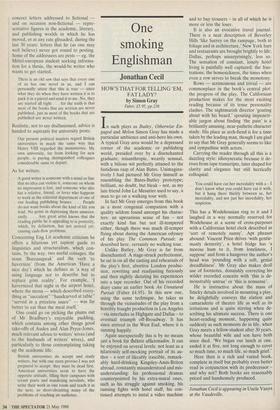One smoking Englishman
Jonathan Cecil
HOW'S THAT FOR TELLING 'EM, FAT LADY? by Simon Gray
Faber, £5.95, pp.236
In such plays as Butley, Otherwise En- gaged and Melon Simon Gray has made a particular ambience and anti-hero his own. A typical Gray area would be a depressed corner of the academic or publishing world, presided over by a disenchanted graduate; misanthropic, wearily sensual, with a bilious wit perfectly attuned to the fastidious rasp of Alan Bates. Unimagina- tively I had pictured Mr Gray himself as resembling the Bates-Butley prototype; brilliant, no doubt, but bleak - not, as my late friend John Le Mesurier used to say, a man to go on a walking tour with.
In fact Mr Gray emerges from this book as a most congenial companion with a quality seldom found amongst his charac- ters: an uproarious sense of fun - not exactly kind fun but not ill-tempered either, though there was much ill-temper flying about during the American odyssey of his play The Common Pursuit: as described here, certainly no walking tour.
Unlike Butley, Mr Gray is far from disenchanted. A stage-struck perfectionist, he sat in on all the casting and rehearsals of the play's first, abortive London produc- tion, rewriting and readjusting furiously and then nightly dictating his experiences into a tape recorder. Out of his recorded diary came an earlier book An Unnatural Pursuit (Faber £4.95). In this new one, using the same technique, he takes us through the vicissitudes of the play from a horribly fraught production in Los Angeles - via interludes in Highgate and Dallas - to eventual triumph off-Broadway. It has since arrived in the West End, where it is running happily.
Again unexpectedly this is by no means just a book for theatre afficionados. It can be enjoyed on several levels: not least as a hilariously self-mocking portrait of its au- thor - a sort of likeably irascible, remark- ably hard-drinking Kingsley-Amis-Briton abroad, constantly misunderstood and mis- understanding: his professional dramas counterpointed by his extra-mural ones, such as his struggle against smoking, his running fights with hotel staff, his con- tinued attempts to instal a video machine and to buy trousers - in all of which he is more or less the loser.
It is also an evocative travel journal. There is a neat description of Beverley Hills 'like Surrey on the rampage, both in foliage and in architecture,' New York bars and restaurants are brought brightly to life; Dallas, perhaps unsurprisingly, less so. The sensation of constant, lonely hotel living is painfully well captured: the frus- trations, the homesickness, the times when even a row serves to break the monotony.
Rows — acrimonious and trivial — are commonplace in the book's central plot: the progress of the play. The Californian production makes for the most exciting reading because of its tense personality clashes. The nightmarish director `goating about with his beard,' spouting impenetr- able jargon about finding 'the pain' is a brilliantly amusing, near-pathetic character study. His place as arch-fiend is for a time taken by the leading man, though I am glad to say that Mr Gray generally seems to like and sympathise with actors.
Carrying the reader through all this is a dazzling style: idiosyncratic because it de- rives from tape transcripts, later shaped for clarity and elegance but still hectically colloquial:
You could have cut her incredulity with a – I don't know what you could have cut it with, but it hung there thickly between us, her incredulity, and not just her incredulity, her suspicion.
This has a Wodehousian ring to it and I laughed in a way normally reserved for Wodehouse at a scene of cross-purposes with a Californian hotel clerk described as `sort of remotely sunny'. Apt phrases abound: Vincent Price drives 'with gentle- manly dexterity', a hotel fridge has 'a morose hum to it, from loneliness, I suppose' and from a hangover the author's head was 'pounding with a soft, genial dreadfulness'. Mr Gray also makes droll use of footnotes, donnishly correcting his wilder recorded conceits with 'this is de- monstrably untrue' or 'this is nonsense'.
He is instructive about the mass of finicky details involved in mounting a play, he delightfully conveys the elation and camaraderie of theatre life as well as its irritations and is quite stirring when de- scribing his ultimate success. There is one heart-rending moment, happening quite suddenly as such moments do in life, when Gray meets a fellow-student after 30 years, whose beautiful wife and son have both since died. 'We began our lunch at one, ended it at five, not long enough to cover so much time, so much life, so much grief.'
Here then is a rich and varied book, complete in itself but probably even better read in conjunction with its predecessor and why not? Both books are reasonably priced and handsomely produced.
Jonathan Cecil is appearing in Uncle Vanya at the Vaudeville.






























































 Previous page
Previous page